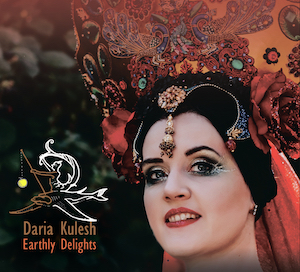 Daria Kulesh – Earthly Delights
Daria Kulesh – Earthly Delights
Self Released – 31 May 2019
Born in Moscow and now based in Kings Langley, Daria Kulesh learned her trade singing folk songs in an Irish pub (which may account for traces of her accent) before moving to the UK and becoming part of folk outfit Kara. She launched her solo career with Eternal Child back in 2015 and Earthly Delights is now her third album, one which extends the Russian folklore and heritage that characterised its predecessor, Long Lost Home, an album inspired by and about her grandmother and the uprooting and exile of the Ingush people under Stalin, but also embraces English folk-rock influences to a greater extent than hitherto. It’s particularly the case on the title track (it and the cover a reference to the Hieronymus Bosch’s triptych), which features Phil Beer on fiddle where the lyrics draw on Anais Nin’s preface to Tropic of Cancer about the cravings and urges that drive us and sets a pagan lust for life against the rigid biblical narrative of virtue and sin as she sings “Oppressed and oppressor, sinner and saint..…One person’s wrongs are another one’s rights.”
In addition to Beer, she’s given sterling backing by a list of collaborators that include fellow former Kara member Kate Rouse on hammered dulcimer, producer Jason Pemberton on an assorted of keys, bass and drums, frequent live accompanist Jonny Dyer on guitar, bouzouki, piano and trumpet and his own musical partner Vicki Swan on double bass, nyckelharpas and English border bagpipes. The shruti box is, of course, all her own work.
Featuring Tom Kitchen on fiddle, the album opens evoking Russian folklore with Golden Apples (the accompanying video premiered on Folk Radio here), the vibrant, rhythmically choppy tune marking a reteaming with Russian musician Igor Devlikamov with whom she co-wrote on her debut, a number that evokes the legend of the Firebird, essentially about not bottling up your desires and passions, though you could read it as about a secret liaison with another’s lover.
The first of four non-originals comes with a sparse, hushed reading of Richard Farina’s call for a kinder world, Quiet Joys of Brotherhood, set to the Irish traditional My Lagan Love and featuring shruti and keys to haunting effect, the tone shifting dramatically for the jaunty, piano trills and double bass backed cabaret-like galumph of Shame and Glory, a playful celebration of the William McGonagalls and Florence Foster Jenkins of the world for their refusal to let lack of talent stand in the way of artistic expression and reminder that it “takes courage to be a joke.”
Although Kulesh provides the delicately shimmering tune, the words to Rusalka are adapted from the 1819 poem by Alexander Pushkin, a variation on the siren myth in the tale of a naked water sprite luring a pious monk to his demise, but not before discovering the freedom and joys of sexual passion. As with Shame or Glory, the accompaniment comes from Belarusian classical pianist Marina Osman, another sometime Kara member and, with Kulesh, the other half of the Firebirds duo.
A further foray into Russian folklore comes with the five-minute Vasilisa, a previous single that opens unaccompanied before a shruti drone sets in and unfolds the instrumentally stark tale (self-empowerment? female emancipation? moral liberation?) of an encounter between the titular Cinderella-like heroine and (featuring a passage of spoken Russian) a deadly revenge she wreaks with the help of with the infamous witch Baba Yaga.
Featuring Rouse and Dyer, the rhythmically pulsing Morozoko mines the same source – and cruel stepmother – with a retelling of the story of how, tied to a tree by her cruel father to die on the freezing forest, her gentle caring nature sees her rewarded by the Russian answer to Father Christmas while her greedy stepsister comes off somewhat worse. Moving from Russia to Ireland, again featuring Osmon, Cap and Bells is a setting the poem by W.B. Yeats to a tune by California author and folklorist Joseph Sobol taken from his arrangement of Wild Swans At Coole, part of his Yeats-themed In The Deep Heart’s Core: A Mystic Cabaret. There is again, however, a Russian connection in that the story of jester possessed of a consuming but unacknowledged love for a queen mirrors The Garnet Bracelet, a factually-based 1911 novella by Alexander Kuprin.
Remaining in Ireland and shifting musical territory to Gaelic folk, Beer again on fiddle and Embereton playing what I assume is a bodhran, Pride Of Petravore is her reading of the Percy French tongue-twisting tale about winning a woman by being mean to them or, as she puts it in the booklet, how women can deceive themselves “into wanting something – or someone – that is not right for us at all.”
Dyer on both trumpet and piano, Made of Light (like Rusalka a revival of a number she recorded with Kara) is the album’s most beautiful song, a simple but stirring hymn to the untrammelled human spirit and soul that showcases the power and delicacy of her voice, the album coming to close with the Kulesh/Dyer collaboration, Greedy King. A contemporary political commentary about those in power who seek only to serve themselves, it mixes together an old Soviet joke, the tradition of holy fools who, in the guise of jesters or madmen, are licensed to speak the truth, and the Wise Men of Gotham fable which serves to provide the rousing finale featuring bagpipes and military drum beat.
Daria recently announced that she’s expecting her first child; she’s already given birth to one of the year’s finest albums.
Pre-Order it here: http://www.daria-kulesh.co.uk/earthly-delights/

